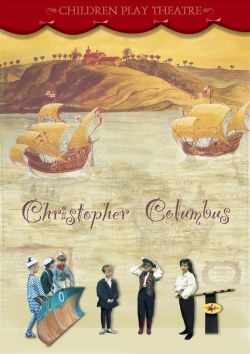|
~ Christopher Columbus ~ Summary
Excerpts: Christopher Columbus Prologue
Sheila: Welcome to “the History Makers”! Tonight’s live broadcast is dedicated to perhaps the most famous explorer of all time, Christopher Columbus. Our panel of experts is here as always to answer your questions on Columbus, the great navigator. The show today is taking place in …. No doubt there are many history enthusiasts in this audience. My name is Sheila Shaw, good evening to you all! Ian: I’m Professor Ian Biggs. Good evening! Mandy: And I’m Doctor Mandy Little. Good evening! Sheila: Let’s have your first question, please. Ben: My name’s Ben Brown. My question is this: Did Christopher Columbus really discover America? Sheila: Ian, let’s have your answer first please. Ian: Well, Ben, that’s a really interesting question. Columbus believed to his dying day that he had reached Asia by sailing west. Actually he was very lucky that America was in the way. It would have been quite impossible to sail all the way to Japan or India without stopping for fresh water and food. Sheila: Do you have anything to add, Mandy? Mandy: Yes indeed. I can’t accept that Columbus discovered America. There were already people living on the islands where Columbus landed, so he couldn’t have discovered them! From the point of view of the Europeans, it must have seemed the most tremendous discovery at the time. From the point of view of the native peoples it was a disaster. Sheila: Well, your answers certainly surprised me! Next question please! Jess: I’m Jess Abbott. My question is this: why do we call Columbus’ time the Age of Discoveries? There were great explorers long before Columbus. Mandy: Yes that’s right, Jess. There were the Egyptians, the Phoenicians and the Romans. The Chinese, the Arabs and the Mongolians were great explorers too. Then the Vikings were fearless sailors, they were the first Europeans to set foot in North America! Ian: True. But during the European Renaissance it became possible, through the work of great scientists, to begin to systematically explore the entire globe. It was called the Age of Discoveries because of very great achievements in the face of very great dangers. Sheila: Why were the voyages so very dangerous? Ian: Their ships were tiny compared to ours today. Like sailing in a coconut shell! Jess: So why didn’t they stay at home? Mandy: The technique of printing had just been invented. So the news of each great discovery spread very quickly, spurring skilled sailors like Columbus to new adventures. Soon European rulers awoke to this chance of greatly increasing their power and riches, while simultaneously spreading Christianity. Sheila: Columbus died in 1506, 500 years ago! It’s an old story, but a fascinating story about ambition, greed and hope, as you will see, don’t you think? Ian: Absolutely, Sheila. Mandy: I entirely agree with you there! End of the Prolouge
.....
Scene 2 At the palace of Ferdinand and Isabella Isabella: At last we can feel safe on our thrones. We have driven the Muslims out of Granada, and we are in firm control! Ferdinand: Call Columbus and the scholars in. After our great victories, I don’t mind listening to the eccentric ideas of our scientists. Ferdinand and Isabella sit down on their thrones. Chancellor Santangel signals to an attendant, who exits and returns with Columbus. Columbus approaches the two thrones and bows. Columbus: Your Majesties! Ferdinand: Captain Columbus, you may listen to the report of the scholars of the University of Salamanca with us. We hear they have at long last completed the examination of your plan. Isabella: Christopher Columbus, are you still convinced of your plan to go westwards to China and India? Columbus: Yes indeed, Your Majesty! Santangel: Call the scholars in! An attendant fetches the scholars. The scholars have attendants who carry a globe, a disk and model boats. Scholars: Your Majesties! Santangel: Please present your report. First scholar: We have not been able to agree on an answer. Santangel: This is very unsatisfactory. You have been investigating Captain (angrily) Columbus’ plan for three years now. Second scholar: And after three years, we still hold three different opinions on the plan. Ferdinand: Then present these three opinions without delay.(impatiently) First Scholar: Observe this globe. Columbus’ plan could only succeed if the earth were a sphere, for only then could you sail westwards to Asia. But the earth cannot be round as anyone can see. If this were the case, then everything at the bottom of the earth would fall off. The scholar demonstrates this with a paper boat that he holds against the underside of a globe, and then lets go. The paper boat falls to the floor and the scholar treads on it. Those present react in agreement or irritable disagreement. Third scholar: I tend to agree with Columbus. Already the Ancient Greeks proved that the earth is a sphere. My calculations of the circumference of the earth are not so very different to those of Columbus. Furthermore, sailors who have voyaged far to the west have reported seeing leafy branches or bits of plants floating in the sea. This indicates islands on the way to Asia. I believe that Columbus will be able to reach China and India safely by travelling west. Ferdinand: That’s two against one. The majority is against the plan, Columbus. Columbus: But the dangers are exaggerated! Our caravels are very swift. And I know the area of the ocean where a favourable wind almost always blows. Ferdinand: A leafy branch floating on the sea is a very slight sign for so very great a risk. Columbus: Your Majesty, the first weak rays of the rising sun seem to (enthusiastically) be a very slight sign – until they are followed by the glories of a wonderfully bright day! Isabella: Christopher Columbus, I am tempted to believe in you. But our treasury is exhausted. All has been spent on the war with Granada, and driving out the Muslims. Columbus: When I return from India you will have enough gold to recapture the Holy Lands from the Muslims once and for all. Isabella: This is a dream, Columbus. Columbus: It is God’s will! Ferdinand: Enough! You have heard my Queen. Captain Columbus we cannot equip you with ships or men. Farewell! Santangel directs Columbus to the exit. There is some whispering between them. Columbus remains on stage, but hidden. Isabella: Come here Chancellor Santangel. Did we make the right decision? Santangel: Of course, Your Majesty. But perhaps I may suggest an idea. Isabella: Speak! Santangel: I myself will finance Captain Columbus’ voyage for you. If he is successful we will get a good return. If not, you need not pay me back. Ferdinand: That’s an interesting proposal. But explain yourself, Santangel. Why risk your money for such a dangerous enterprise? You are a most careful man. Santangel: I am a good Catholic. But you know of course that I am a converted Jew. I know Your Majesties’ plans to free Spain from all Jews. Perhaps Columbus will find an island to the west to which all Jews could emigrate. Isabella: I see. You may inform Christopher Columbus that he will receive three ships and the men he needs. If he cannot find enough volunteers, I will set some criminals free if they agree to sail with him. However, Chancellor Santangel, only good Christians, or men converted to Christianity, may travel on this, or any future voyage in the name of Spain. Columbus: Thank you a thousand times, Your Majesty. I will not fail you! (re-entering andbowing dramatically) Characters, scene by scene
Proposals for sceneries: 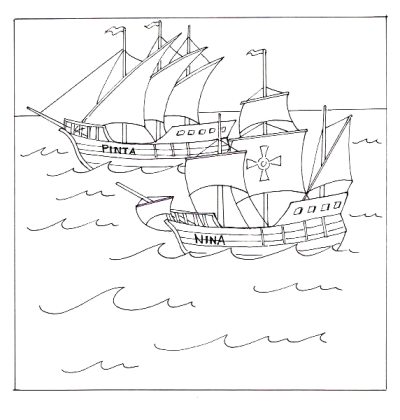 The ships "Nina" and Pinta" (scene 3, right side) .... Background notes on Columbus and his time: 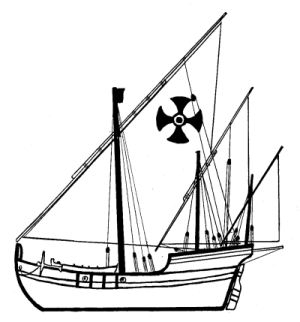 Fig.
1 A caravel
The
beginning of the Age of Discoveries is marked by an outstanding
character of vital importance: Henry the Navigator (1394 – 1460), son
of the King of Portugal. This prince was the first to initiate and
sponsor the systematic exploration of the world by sailing the oceans.
His motives for these activities were due more to political than
academic reasons. The Arabs were still a threat to the realms of the
Iberian Peninsula and thus for Portugal, so Henry intended to put
pressure on the Arabs not only from Europe but also from the south. He
aimed to contact the legendary Priest-King John, who was believed to
rule a large Christian realm in East Africa (which was then believed to
be part of India), and to win him as an ally. The entire southern and
eastern Mediterranean was under Islamic rule, so it was not possible to
contact the priest-king by land (although there had been several
unsuccessful attempts to do so).
According to the geographical knowledge of those days, the ships had to sail south along the African coast to the estuary of the Niger (see fig. 2). This river was believed to have its source in Ethiopia and to flow from east to west into the Atlantic Ocean. The aim of the original voyages of discovery was therefore to reach the priest-king and India by ship. The successful realization of such voyages demanded that geographical knowledge be gathered and evaluated, navigational aids be developed, captains be trained to use them, and crews be recruited that were willing to take the risks of such an endeavour. It was furthermore of the utmost importance to develop ships suitable for such voyages. Photos of a production: 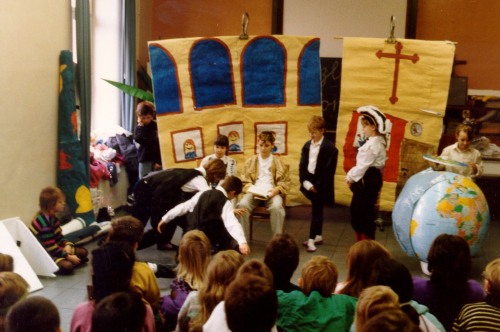 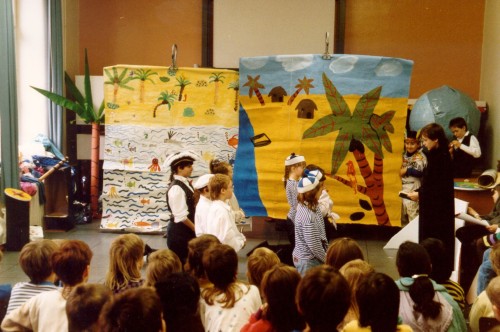 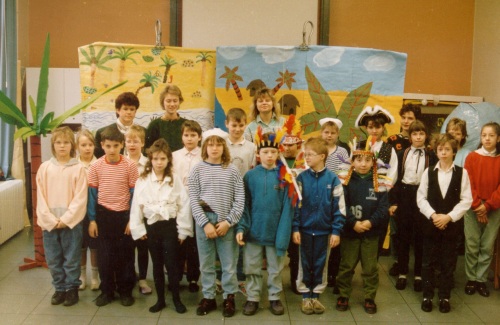 |
||||||||||||||||||||||||||||||||||||||
|
webmaster: designcase.net Copyright © 2007 kinderspielentheater.de |
||||||||||||||||||||||||||||||||||||||

